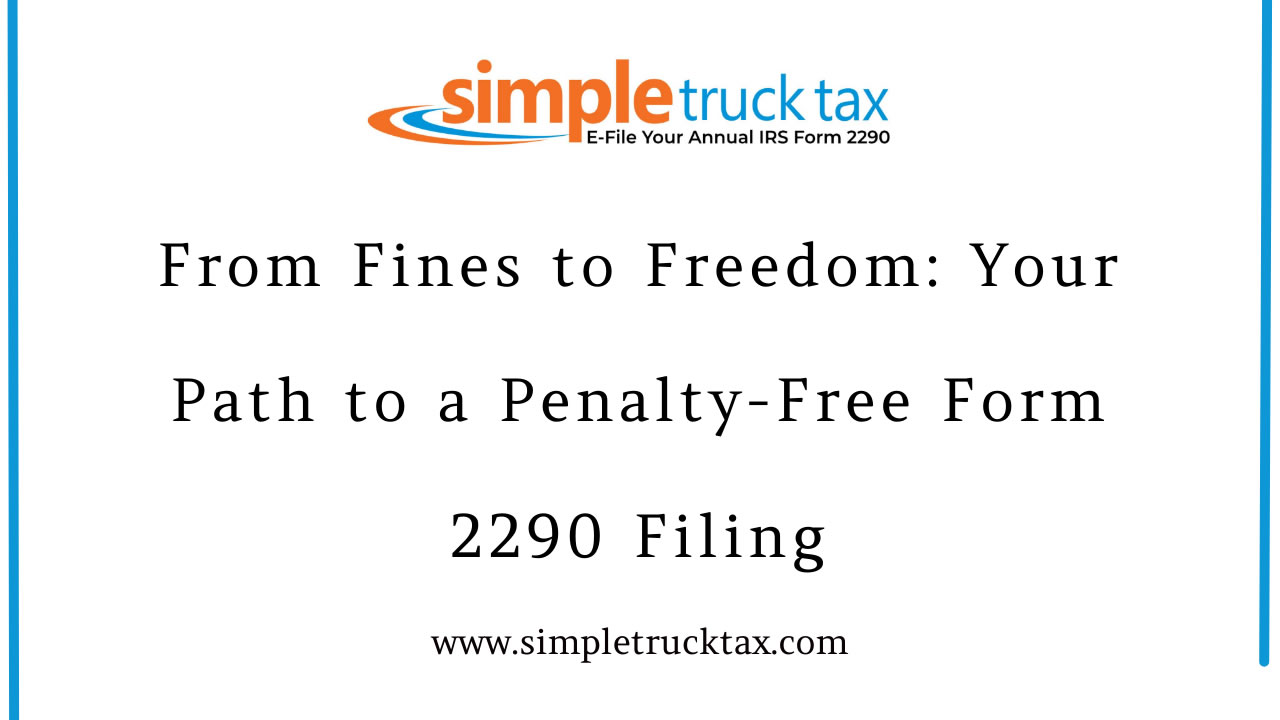
From Fines to Freedom: Your Path to a Penalty-Free Form 2290 Filing
As a fleet manager or truck owner, the last thing you want is an unexpected bill from the IRS. The Heavy Highway Vehicle Use Tax (HVUT), reported on IRS Form 2290, is an important duty.
Missing the deadline or getting something wrong can result in substantial financial penalties, but with the right information, it's easy to get through the process and remain compliant.
This manual will guide you through the highlights of Form 2290 penalties, due dates, and present you with a straight-forward route to a hassle-free, penalty-free return.
Knowing the Form 2290 Due Date
For the majority of vehicles, the Form 2290 deadline is August 31st of every year, covering the tax period July 1st to June 30th. If a vehicle is put into service after July, though, the deadline is the last day of the month after the month in which the vehicle is put to "first use."
Placing this filing deadline on your calendar is the initial and most crucial step to penalty avoidance.
The High Cost of Procrastination: Form 2290 Penalties
The IRS takes the Heavy Vehicle Use Tax seriously because it pays for our highways. Not filing or paying on time triggers a combination of penalties and interest that can mount up fast.
- Failure to File Penalty: This is the most important penalty. The IRS charges a penalty of 4.5% of the total tax owed for every month (or part of a month) the form is late, with a maximum of 25%.
- Failure to Pay Penalty: Even if you timely file, not paying the tax incurs an extra monthly penalty of 0.5% of the amount of tax not paid, also up to 25%.
- Interest Charges: In addition to the penalties, the IRS adds interest on any unpaid tax from the date of the due date until paid in full. The rate of interest is set quarterly.
These aggregate fees make a nominally small tax bill expand exponentially into a large outlay. But there is more to worry about than just the money. Not having a stamped Schedule 1—their official record of payment—can have state-level ramifications, such as suspension of vehicle registration.
This can stop your business dead in its tracks, wasting your time and profits.
Your Road to a Penalty-Free Filing
So how do you keep from making those expensive blunders and earn your HVUT tax freedom?
- File on Time: The best advice is to e-file your Form 2290 long before the August 31st deadline. This allows you to make any necessary corrections and have your filing processed in a timely manner.
- E-File for Instant Compliance: Ditch the mail-in returns. With an IRS-approved e-filing provider, you have a stamped Schedule 1 in minutes, not weeks. This electronic proof of payment is essential to renew your vehicle registration and prevent roadside trouble.
- Know Your Exemptions: Are you aware that some vehicles are exempt from taxation? These include logging, agriculture, or vehicles that do not meet the annual use miles quota. Knowing these exemptions will save you money and avoid unnecessary filing.
- Consider Penalty Abatement: If you have a good, documented excuse for a late filing, the IRS will offer penalty relief. You can file a First-Time Penalty Abatement (FTA) if you have three years of clean compliance history. Although this isn't a sure thing, it's something to consider if you've incurred a penalty.
Conclusion: Your Next Steps
Don't make the Form 2290 experience stressful. By learning about the HVUT deadline, the risk of financial penalties for late filing, and taking advantage of the convenience of e-filing, you can stay compliant and do what you do best: keep America's economy in motion.